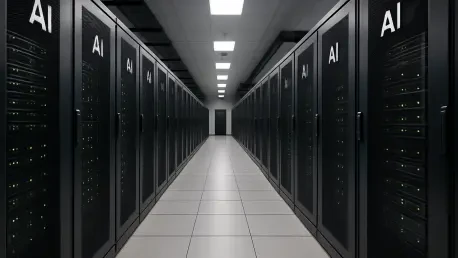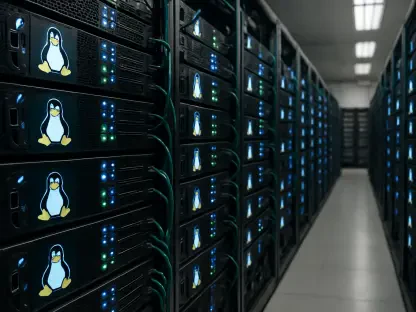Setting the Stage for AI Infrastructure
Imagine a world where artificial intelligence powers everything from healthcare diagnostics to autonomous vehicles, but the backbone of this revolution—computing infrastructure—struggles to keep pace with demand. This is the reality facing tech giants today as AI workloads skyrocket, pushing companies like Microsoft to expand their data center capabilities at an unprecedented rate. The challenge lies not just in scaling up, but in doing so sustainably and efficiently, amidst global energy constraints and environmental concerns.
The surge in AI applications has created a critical need for high-performance computing resources, prompting Microsoft to forge strategic partnerships and adopt innovative technologies. One such collaboration, with Nscale at the Start Campus in Sines, Portugal, exemplifies this push toward cutting-edge infrastructure. This review delves into how Microsoft is addressing these demands through advanced hardware, sustainable design, and industry alliances.
Analyzing Microsoft’s AI Data Center Features
Partnership and Infrastructure at Start Campus
Microsoft’s collaboration with Nscale, a prominent “neocloud” provider, marks a significant step in bolstering AI computing power. By renting data center capacity at the Start Campus, located about 93 miles south of Lisbon, Microsoft taps into a facility designed for high-performance workloads. This partnership builds on previous engagements with Nscale in Norway and the UK, showcasing a consistent strategy of leveraging specialized operators to meet capacity needs.
Set to be operational by early next year, the Start Campus will house 12,600 Nvidia Blackwell Ultra GB300 GPUs, positioning it at the forefront of AI hardware integration. This cutting-edge technology enhances Microsoft’s ability to process complex AI models efficiently. The campus itself, with plans for six data center buildings and an estimated cost of €8.5 billion (approximately $9.8 billion), underscores the scale of investment required to support the digital economy.
Beyond hardware, the project reflects a broader trend of outsourcing to specialized data center operators. As internal resources fall short, Microsoft’s agreements with providers like CoreWeave and Nebius highlight a shift toward collaborative infrastructure solutions. This approach allows rapid scaling while focusing internal efforts on innovation and core services.
Sustainability as a Core Component
A standout feature of the Start Campus is its commitment to eco-friendly operations, a critical consideration given the massive energy demands of data centers. The facility will run entirely on renewable energy, utilizing Portugal’s robust green power grid. Additionally, cooling systems employ cold ocean water, a novel method to conserve freshwater resources in the region.
Further enhancing its environmental credentials, the campus uses backup generators powered by hydro-treated vegetable oil, reducing carbon emissions compared to traditional diesel alternatives. However, questions linger about Portugal’s renewable energy capacity to sustain growing AI infrastructure demands, even with over half of its power sourced from renewables. This tension between technological growth and resource availability remains a key area of focus.
Microsoft’s emphasis on sustainability through such designs sets a benchmark for the industry, balancing operational needs with ecological responsibility. The integration of these practices at Start Campus could serve as a blueprint for future data center developments, provided energy scalability challenges are addressed.
Nscale’s Technological and Industry Impact
Nscale emerges as a pivotal player in this ecosystem, having transitioned from a cryptocurrency mining background to a leader in high-performance computing. The British company’s recent funding rounds, totaling over $1.5 billion, reflect strong investor confidence in its ability to deliver specialized cloud services. This financial backing fuels its expansion and technological advancements.
Partnerships with tech heavyweights like Nvidia and OpenAI in the UK further solidify Nscale’s role in the AI computing landscape. By aligning with such entities, the company not only enhances its credibility but also contributes to the broader adoption of AI technologies. Its collaboration with Microsoft at Start Campus exemplifies how neocloud providers bridge capacity gaps for major corporations.
The growth of Nscale highlights an industry shift toward specialized operators capable of delivering tailored solutions for AI workloads. As demand for computing power intensifies, firms like Nscale are poised to play an increasingly vital role in shaping infrastructure strategies across the tech sector.
Performance Challenges and Industry Context
Scalability and Energy Constraints
While the technological advancements at Start Campus are impressive, significant challenges loom over AI data center expansion. Energy capacity remains a primary concern, as the computational needs of AI models continue to escalate. Even with renewable energy adoption, the strain on national grids, particularly in regions like Portugal, poses risks to long-term scalability.
Regulatory and environmental hurdles also complicate growth. Stricter guidelines on resource consumption and emissions could impact the pace of new facility development. Microsoft and its partners must navigate these complexities while maintaining momentum in AI innovation, a balancing act that tests both operational and strategic capabilities.
Efforts to address these issues are underway, with ongoing investments in energy-efficient technologies and sustainable practices. However, the industry must prioritize infrastructure planning and policy advocacy to ensure that growth does not outstrip available resources, a critical factor for sustained performance in AI computing.
Industry Trends and Competitive Landscape
The broader tech landscape reveals a clear trend of outsourcing to neocloud providers as a response to capacity shortages. Microsoft’s strategy aligns with moves by other giants adapting to the AI boom through external partnerships. This collaborative model enables faster deployment of resources while mitigating the risks of overextending internal infrastructure.
Specialized operators offer not just capacity but also expertise in high-performance computing, a niche that traditional cloud providers may lack. This shift redefines competitive dynamics, with neocloud firms becoming integral to the AI ecosystem. Microsoft’s alliances with such entities position it favorably in a market increasingly driven by speed and scalability.
As AI applications permeate diverse sectors, the demand for robust infrastructure will only intensify. The ability to adapt through strategic partnerships and innovative designs will likely determine which companies lead in this space, with Microsoft’s current initiatives offering a strong foundation for future competitiveness.
Final Thoughts on Microsoft’s AI Infrastructure Journey
Looking back, Microsoft’s strategic moves to expand AI data center capabilities through partnerships like the one with Nscale at Start Campus demonstrate a forward-thinking approach to tackling the computational demands of artificial intelligence. The integration of advanced Nvidia GPUs and a strong emphasis on sustainable operations mark significant steps in addressing both performance and environmental concerns.
Moving forward, the focus should shift to actionable solutions for energy scalability, such as investing in next-generation renewable technologies and advocating for policies that support grid expansion. Collaborations with neocloud providers must deepen, ensuring that infrastructure keeps pace with AI innovation without compromising ecological goals.
Additionally, industry-wide efforts to standardize sustainable practices could amplify the impact of individual projects like Start Campus. By prioritizing research into energy-efficient computing and fostering dialogue with regulators, Microsoft and its peers can pave the way for a resilient AI infrastructure landscape, ready to meet the challenges of tomorrow.









